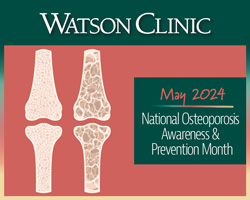 Osteoporosis is a disease that makes bones dangerously fragile. While there is no cure for the condition, there are treatments that can slow its progress and reduce your risk for fractures or bone breaks.
Osteoporosis is a disease that makes bones dangerously fragile. While there is no cure for the condition, there are treatments that can slow its progress and reduce your risk for fractures or bone breaks.
Diet and lifestyle changes may play a key role in these treatments. A diet rich in calcium and vitamin D is essential. Your doctor may also advise supplements of other vitamins or minerals.
Regular walking or muscle-strengthening workouts can also help protect your bones.
Smoking speeds bone loss, so it’s important that you ask your doctor for assistance in quitting if you’re a smoker.
You can reduce your risk of falls at home by getting rid of tripping hazards like clutter on floors, throw rugs and loose cords.
Additional steps may be required, especially if you've already fractured a bone or if your DEXA bone density test reveals you're at high risk of a fracture. Your doctor may advise prescription medicine to help prevent a first or additional fracture.
A widely prescribed class of osteoporosis drugs are bisphosphonates, which slow bone loss in women past menopause. Other types of osteoporosis drugs may be taken as well, including ones that help men.
Together, you and your doctor can find the best match for you, taking into account things like your age, gender, and overall health.
Watson Clinic’s Rheumatology department treats a wide array of complex inflammatory conditions, including osteoporosis, arthritis and fibromyalgia. They utilize the most advanced technologies to provide accurate diagnosis and targeted treatments, including the DEXA bone density scan for the detection of osteoporosis. Schedule an appointment at Watson Clinic Main by calling 863-680-7486.
Sources: National Osteoporosis Foundation; UpToDate; U.S. Food and Drug Administration